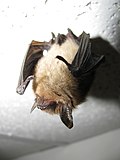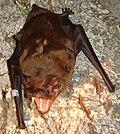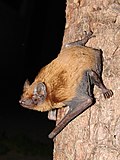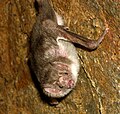The northern bat (Eptesicus nilssonii) is the most abundant species of bat in northern Eurasia occurring from France to Hokkaidō and south to Kazakhstan...
5 KB (567 words) - 04:02, 22 May 2024
The northern ghost bat (Diclidurus albus) is a bat species from South America, Trinidad, and Central America. It is a relatively rare, completely white...
10 KB (1,349 words) - 02:44, 4 November 2024
The northern yellow bat (Lasiurus intermedius) is a non-migratory bat in the family Vespertilionidae, typically active year-round except during abnormally...
6 KB (717 words) - 02:21, 13 January 2024
Myotis septentrionalis (redirect from Northern long-eared bat (myotis))
as the northern long-eared bat or northern myotis, is a species of bat native to North America. There are no recognized subspecies. The northern long-eared...
12 KB (1,333 words) - 16:12, 30 May 2024
noctule bat (Nyctalus lasiopterus) is a rare carnivorous bat found in Europe, West Asia, and North Africa. It is the largest and least studied bat in Europe...
21 KB (2,670 words) - 03:56, 22 May 2024
thin membrane or patagium. The smallest bat, and arguably the smallest extant mammal, is Kitti's hog-nosed bat, which is 29–34 mm (1.1–1.3 in) in length...
171 KB (18,309 words) - 04:18, 2 November 2024
Northern long-eared bat is a common name for several flying mammals, species of Chiroptera Myotis septentrionalis, a North American bat, also known as...
326 bytes (82 words) - 13:24, 16 September 2023
The northern cave bat (Vespadelus caurinus) is a vesper bat that occurs throughout most of Australia. A species of Vespadelus, smaller insectivorous microbats...
6 KB (634 words) - 11:24, 23 November 2022
The tricolored bat (Perimyotis subflavus) or American perimyotis is a species of microbat native to eastern North America. Formerly known as the eastern...
25 KB (2,849 words) - 02:58, 28 July 2024
The hoary bat (Lasiurus cinereus) is a species of bat in the vesper bat family, Vespertilionidae. It lives throughout most of North America (and possibly...
13 KB (1,375 words) - 02:46, 13 January 2024
name "borealis" is Latin in origin, meaning "northern." Of the species in its genus, the eastern red bat is most closely related to other red bats, with...
15 KB (1,552 words) - 00:53, 17 October 2023
The big brown bat (Eptesicus fuscus) is a species of vesper bat distributed widely throughout North America, the Caribbean, and the northern portion of South...
45 KB (4,713 words) - 16:29, 14 October 2024
Pipistrellus (redirect from Pipistrelle Bat)
derived from the Italian word pipistrello, meaning "bat" (from Latin vespertilio "bird of evening, bat"). The size of the genus has been considerably reduced...
4 KB (425 words) - 15:58, 14 October 2023
nectar bat (Macroglossus minimus), also known as the northern blossom bat, honey nectar bat, least blossom-bat, dagger-toothed long-nosed fruit bat, and...
10 KB (932 words) - 20:46, 16 October 2024
The northern freetail bat (Mops jobensis) is a species of bat found in Yapen, Seram Island, Western New Guinea and Northern Australia. It was described...
6 KB (532 words) - 11:25, 14 December 2023
The pallid bat (Antrozous pallidus) is a species of bat that ranges from western Canada to central Mexico. It is the sole species of its genus and is closely...
13 KB (1,448 words) - 21:08, 15 July 2024
Lonchorhina Tomes's sword-nosed bat (Lonchorhina aurita) Fernandez's sword-nosed bat (Lonchorhina fernandezi) Northern sword-nosed bat (Lonchorhina inusitata)...
35 KB (3,620 words) - 12:26, 7 July 2024
that are endemic are identified below; this number includes 37 species of bat), 19 introduced species, 40 species of Cetacea, and the dugong—161 are listed...
56 KB (3,829 words) - 11:10, 4 September 2024
white-winged vampire bat (Diaemus youngi), a species of vampire bat, is the only member of the genus Diaemus. They are found from Mexico to northern Argentina and...
12 KB (1,356 words) - 00:02, 29 March 2024
The serotine bat (Eptesicus serotinus), also known as the common serotine bat, big brown bat, or silky bat, is a fairly large Eurasian bat with quite large...
13 KB (1,446 words) - 14:16, 20 July 2024
Common noctule (redirect from Common Noctule bat)
The common noctule (Nyctalus noctula) is a species of insectivorous bat common throughout Europe, Asia, and North Africa. The common noctule's short fur...
15 KB (1,929 words) - 00:37, 1 November 2024
The brown long-eared bat or common long-eared bat (Plecotus auritus) is a small Eurasian insectivorous bat. It has distinctive ears, long and with a distinctive...
7 KB (791 words) - 12:34, 26 June 2024
hematophagy. Three extant bat species feed solely on blood: the common vampire bat (Desmodus rotundus), the hairy-legged vampire bat (Diphylla ecaudata), and...
36 KB (4,107 words) - 20:11, 14 October 2024
The northern leaf-nosed bat (Hipposideros stenotis) is a micro-bat of the family Hipposideridae, known as "leaf-nosed" bats. The species is endemic to...
5 KB (585 words) - 03:16, 17 December 2023
Aethalops Pygmy fruit bat (Aethalops alecto) Borneo fruit bat (Aethalops aequalis) Genus Alionycteris Mindanao pygmy fruit bat (Alionycteris paucidentata)...
136 KB (13,118 words) - 02:35, 17 August 2024
The spotted bat (Euderma maculatum) is a species of vesper bat and the only species of the genus Euderma. The spotted bat was first described by zoologist...
3 KB (311 words) - 08:59, 11 July 2024
barbastellus NT Genus: Eptesicus Gobi big brown bat, Eptesicus gobiensis LC Northern bat, Eptesicus nilssoni LC Serotine bat, Eptesicus serotinus LC Genus: Nyctalus...
49 KB (4,630 words) - 02:15, 8 September 2024
bat (Myotis myotis), whiskered bat (Myotis mystacinus), Geoffroy's bat (Myotis emarginatus), Northern bat (Eptesicus nilssonii), Lesser horseshoe bat...
21 KB (2,112 words) - 16:02, 10 September 2024
including the Indiana bat, northern long-eared bat, and Arizona myotis, to which it is closely related. Despite its name, the little brown bat is not closely...
62 KB (6,993 words) - 07:29, 29 August 2024
The evening bat (Nycticeius humeralis) is a species of bat in the vesper bat family that is native to North America. Hunting at night, they eat beetles...
12 KB (1,309 words) - 18:16, 22 November 2022


























